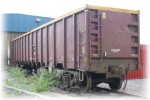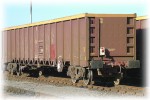| << Profile 15 >> |
MBA/MCA/MDA/MOA Bogie Open Wagons |



| Build Details: |
1999-2003, Thrall Europa, York and Czech Republic |
| Numbering: |
500001-500350 |
| Bogies / Suspension: |
NACO Swing-Motion |
| Dimensions: |
|
| Published Drawings: |
|
| Areas of operation: |
Nationwide |
| Main liveries: |
Red |
| Summary: |
These large bogie open wagons were one of several types built by Thall at York Works as part of the reinvigoration of the freight fleet by EWS. Ironically, the big, American-looking MBAs turned out to be too large and many had their height cut-down fairly soon after delivery, to form types MCA and MDA. Further wagons were built to the reduced height (as MOAs), these being mainly used on infrastructure work alongside the MCA/MDA fleet, while the full-height MBAs eventually found employment on a wide variety of revenue flows. |
|
| History: |
When English Welsh and Scottish Railway (EWS) took over the three regional railfreight companies in 1996 they initially concentrated on repairs and rebodying programmes to provide the wagons for newly won freight flows. Then, in July 1997, they announced that at least 2500 new wagons would be built by American-owned company Thrall at the reopened York Works. The first types to appear were steel and container wagons (BRA, BYA and FAA), followed by general-purpose open wagons from spring 1999. These bogie wagons, to TOPS code MBA, had a distinctly American look to them, resemebling the large gondolas common on US railroads. Formed of a basic, high-sided box with vertical ribs on the sides to provide strengthening, the wagons were mounted on three-piece ‘swing-motion’ bogies (imported as kits from Canada). A small door near the centre of each side allowed access for sweeping out. One of few technical innovations featured was a self-weighing device to avoid the risk of overloading. Livery was overall EWS maroon with the top capping in yellow.
The initial plan was for most of the wagons to have AAR buckeye or swing-head (a buck-eye coupler which could swing to one side to reveal a standard hook) couplers and no buffers. Three AARKNDS were assigned as follows: MBA-A for wagons with buffers and swing-head couplings, MBA-B for wagons with no buffers and AAR couplings and MBA-C for wagons with standard buffers and drawgear. MBA-A and MBA-C were to have a carrying capacity of 71.2 tonnes while the lighter MBA-B could take 71.9 tonnes. Initially wagon numbers 500001 to 500060 were built as MBA-A (to design code MB001A) and 500061 to 500300 as MBA-B (MB001B). No wagons were built to MBA-C.
The wagons, known as ‘Monster Boxes’ due to their size, found use carrying aggregates, scrap metal, timber and slag and were also trialled carrying coal for mining firm RJB. However, utilisation was not as high as had been hoped, and there were also problems at some terminals with the height of wagons. The design was intended to be unloaded using mechanical grabs and these obviously required quite a bit of height to operate clear of the sides. Less than a year after the first deliveries, a plan was announced to reduce the height of 100 of the wagons. Interestingly at about the same time, work was started on cutting down some of the 4-wheel MEA box wagons to produce MFAs. The first cut-down MBAs, with the body reduced to about a third of the original height, appeared in the second half of 2000 but were initially placed in store. The conversions affected wagons numbered 500201 to 500240, which became MCA ‘outer’ wagons with swing-head coupler and buffers at both ends, and 500241 to 500300, which became MDA ‘inner’ wagons. The new design codes were unusual, being MC100A and MD100A respectively. This was possibly due to the large number of design codes issued in the MC- and MD- series for 16 ton and 21 ton mineral wagons respectively. By the end of the year the first few MCA/MDA sets entered service on infrastructure work. In service they were used in five wagon sets with two MCAs flanking a trio of MDAs. Although thought to have been delivered as MBA-As to MB001A, the first 60 wagons (500001 to 500060) were by 2008 coded as MBA-Cs to MB001C. 500061 to 500200 remained as MB001B.
A further batch of 50 low-height wagons was ordered in 2003 but, due to the closure of the York works, these were built in the Thrall Europa factory at Studenka in the Czech Republic. In appearance, the new wagons were almost identical to the cut-down MCAs, having buffers at each end. However, they carried standard screw couplings rather than the swing-head type, and were therefore coded as MOA-A. Numbers followed on from the MBA family, starting at 500301. All were originally to design code MO001A but, by 2008, 37 wagons had been amended to MO001B, for reasons unknown. As with the MCA/MDAs, the type was used on ballast and spoil carrying duties in connection with infrastructure works including the West Coast route modernisation project.
Many more low-height open wagons similar to the MCA/MDA/MOA types were delivered over the next few years, for Network Rail (JNA), GBRailfreight and EWS itself (both MLA). |
|
| Queries: |
|
|
| References: |
|
|
| Links: |
 PDF version of this profile (Right click and select Save Target As to save (277KB)) PDF version of this profile (Right click and select Save Target As to save (277KB))
Photos of MBA wagons on Paul Bartlett's website
Photos of MBA wagons on Martyn Read's website
Photos of MCA and MDA wagons on Martyn Read's website
Photos of MOA wagons on Martyn Read's website
Photos of MBA wagons on Andy Jupe's website
Photos of MCA wagons on Andy Jupe's website
Photos of MDA wagons on Andy Jupe's website
Photos of MOA wagons on Andy Jupe's website
|
|
| Updates: |
15/03/2013: Photo links (finally) updated.
|
|
| Photos |
| For more pictures see the Links section at the bottom |

MBA 500165 (without buffers) at Westbury, 13th August 2004.
Martyn Read

MBA 500036 (with buffers) at Westbury, 2nd September 2005.
Martyn Read

MDA 500277 at Bescot, 22nd February 2004.
Martyn Read

MOA 500329 at Bescot, 22nd February 2004.
Martyn Read
|
|









